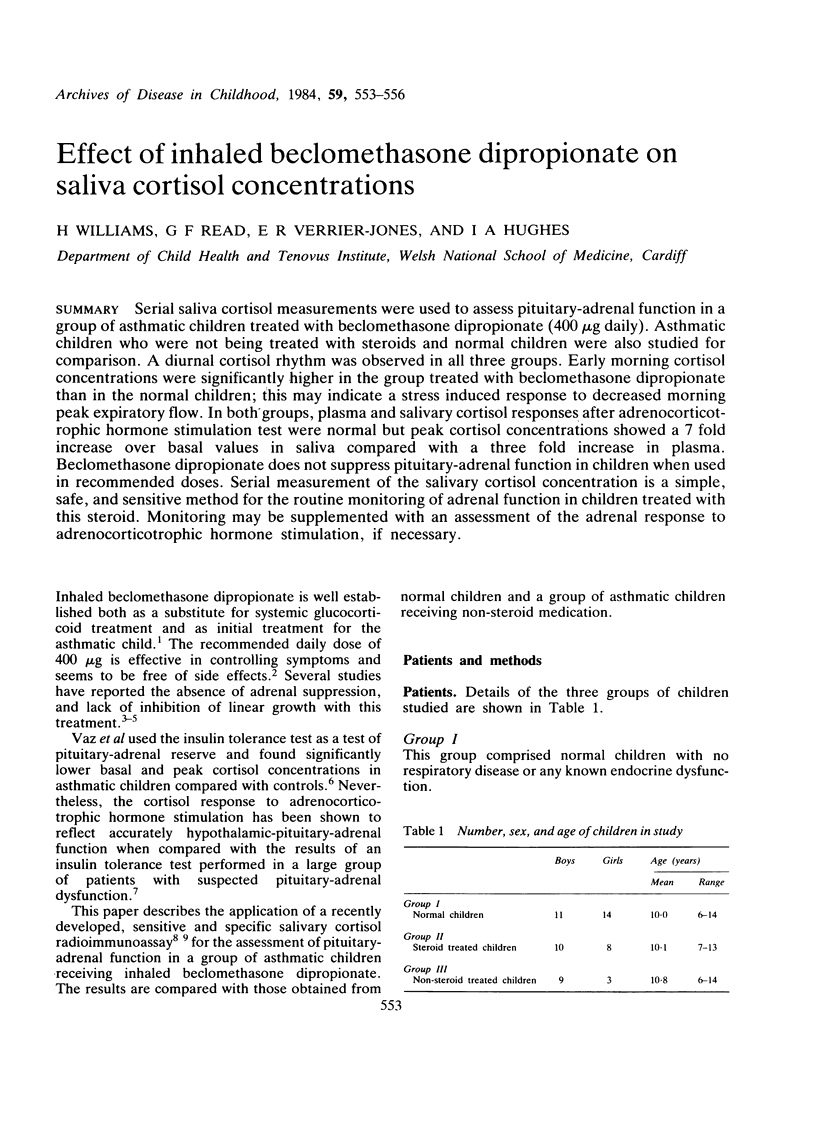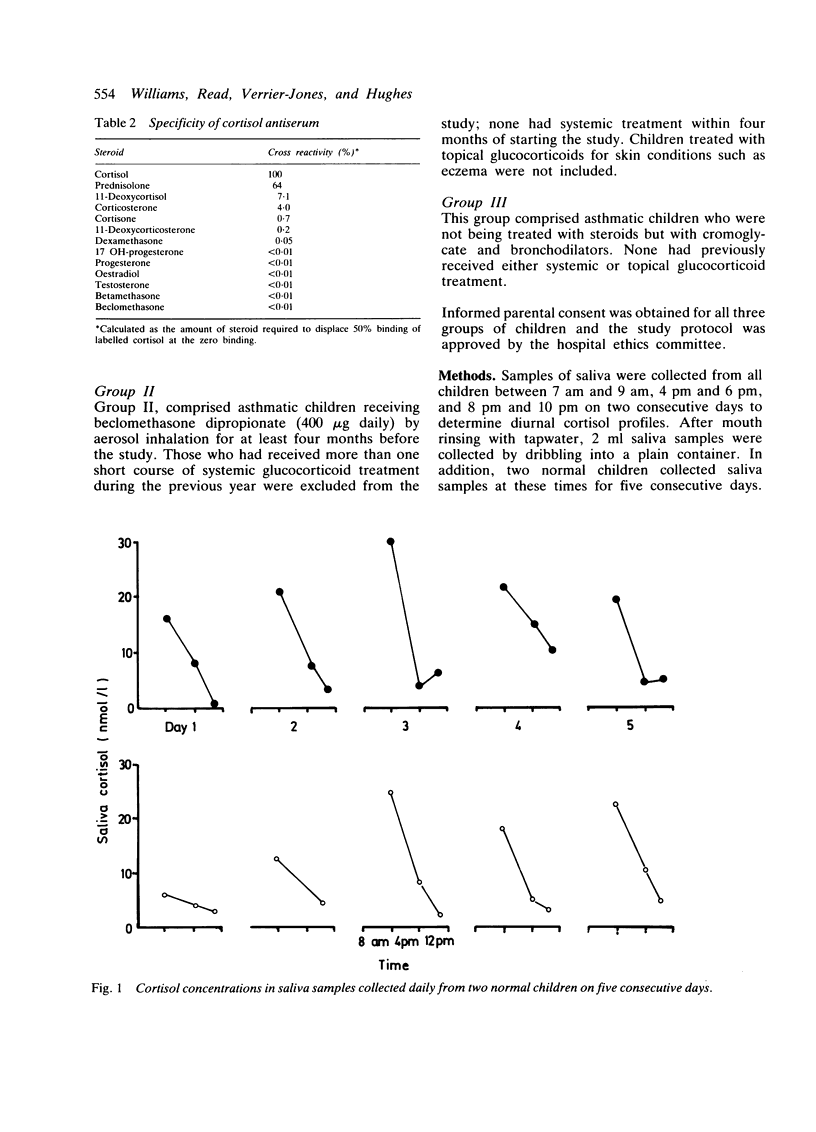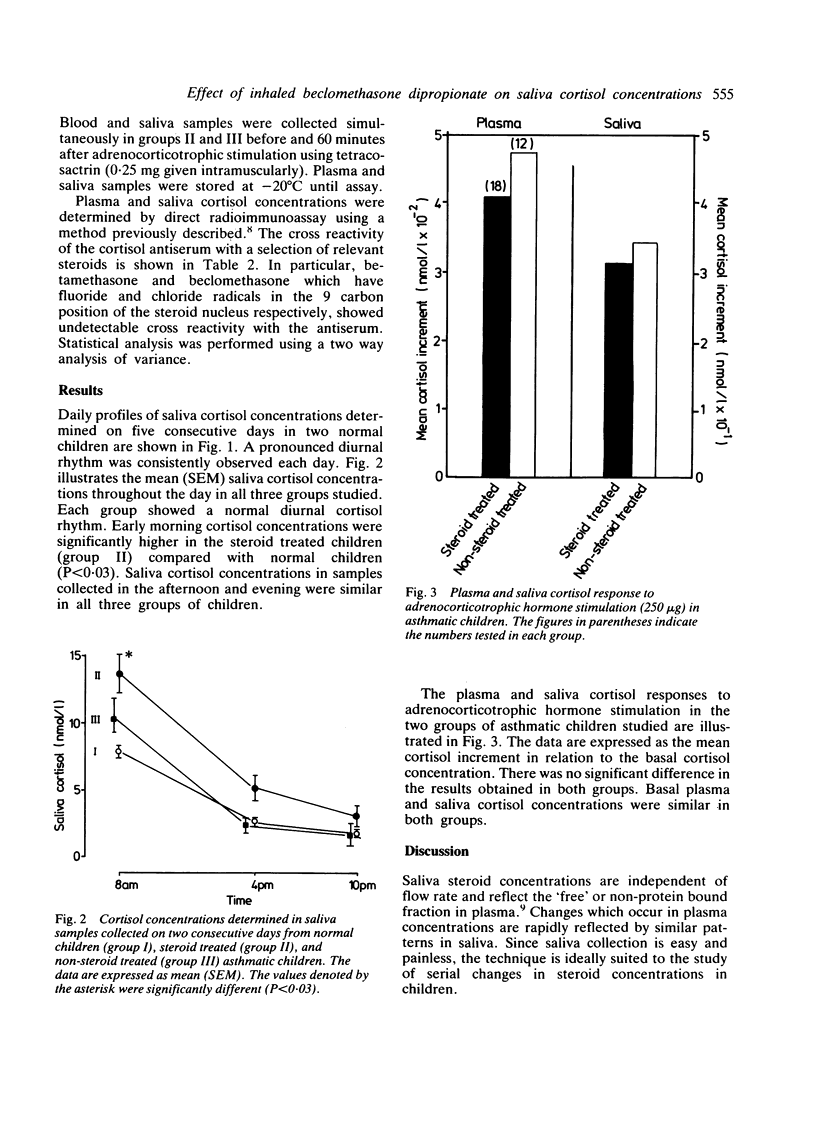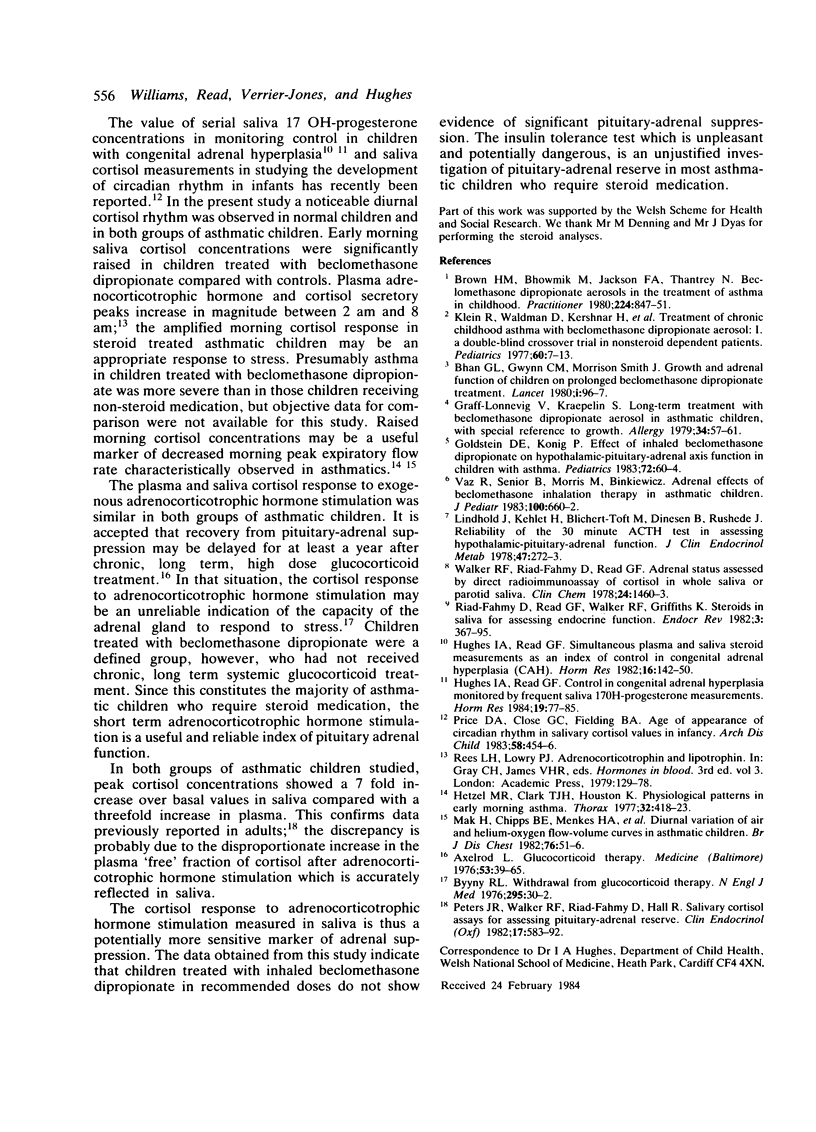Abstract
Serial saliva cortisol measurements were used to assess pituitary-adrenal function in a group of asthmatic children treated with beclomethasone dipropionate (400 micrograms daily). Asthmatic children who were not being treated with steroids and normal children were also studied for comparison. A diurnal cortisol rhythm was observed in all three groups. Early morning cortisol concentrations were significantly higher in the group treated with beclomethasone dipropionate than in the normal children; this may indicate a stress induced response to decreased morning peak expiratory flow. In both groups, plasma and salivary cortisol responses after adrenocorticotrophic hormone stimulation test were normal but peak cortisol concentrations showed a 7 fold increase over basal values in saliva compared with a three fold increase in plasma. Beclomethasone dipropionate does not suppress pituitary-adrenal function in children when used in recommended doses. Serial measurement of the salivary cortisol concentration is a simple, safe, and sensitive method for the routine monitoring of adrenal function in children treated with this steroid. Monitoring may be supplemented with an assessment of the adrenal response to adrenocorticotrophic hormone stimulation, if necessary.
Full text
PDF



Selected References
These references are in PubMed. This may not be the complete list of references from this article.
- Axelrod L. Glucocorticoid therapy. Medicine (Baltimore) 1976 Jan;55(1):39–65. doi: 10.1097/00005792-197601000-00003. [DOI] [PubMed] [Google Scholar]
- Bhan G. L., Gwynn C. M., Smith J. M. Growth and adrenal function of children on prolonged beclomethasone dipropionate treatment. Lancet. 1980 Jan 12;1(8159):96–97. doi: 10.1016/s0140-6736(80)90522-x. [DOI] [PubMed] [Google Scholar]
- Brown H. M., Bhowmik M., Jackson F. A., Thantrey N. Beclomethasone dipropionate aerosols in the treatment of asthma in childhood. Practitioner. 1980 Aug;224(1346):847–851. [PubMed] [Google Scholar]
- Goldstein D. E., König P. Effect of inhaled beclomethasone dipropionate on hypothalamic-pituitary-adrenal axis function in children with asthma. Pediatrics. 1983 Jul;72(1):60–64. [PubMed] [Google Scholar]
- Graff-Lonnevig V., Kraepelien S. Long-term treatment with beclomethasone dipropionate aerosol in asthmatic children with special reference to growth. Allergy. 1979 Feb;34(1):57–61. doi: 10.1111/j.1398-9995.1979.tb02001.x. [DOI] [PubMed] [Google Scholar]
- Hetzel M. R., Clark T. J., Houston K. Physiological patterns in early morning asthma. Thorax. 1977 Aug;32(4):418–423. doi: 10.1136/thx.32.4.418. [DOI] [PMC free article] [PubMed] [Google Scholar]
- Hughes I. A., Read G. F. Control in congenital adrenal hyperplasia monitored by frequent saliva 17OH-progesterone measurements. Horm Res. 1984;19(2):77–85. doi: 10.1159/000179870. [DOI] [PubMed] [Google Scholar]
- Hughes I. A., Read G. F. Simultaneous plasma and saliva steroid measurements as an index of control in congenital adrenal hyperplasia (CAH). A longitudinal study. Horm Res. 1982;16(3):142–150. doi: 10.1159/000179495. [DOI] [PubMed] [Google Scholar]
- Klein R., Waldman D., Kershnar H., Berger W., Coulson A., Katz R. M., Rachelefsky G. S., Siegel S. C. Treatment of chronic childhood asthma with beclomethasone dipropionate aerosol: I. A double-blind crossover trial in nonsteroid-dependent patients. Pediatrics. 1977 Jul;60(1):7–13. [PubMed] [Google Scholar]
- Lindholm J., Kehlet H., Blichert-Toft M., Dinesen B., Riishede J. Reliability of the 30-minute ACTH test in assessing hypothalamic-pituitary-adrenal function. J Clin Endocrinol Metab. 1978 Aug;47(2):272–274. doi: 10.1210/jcem-47-2-272. [DOI] [PubMed] [Google Scholar]
- Peters J. R., Walker R. F., Riad-Fahmy D., Hall R. Salivary cortisol assays for assessing pituitary-adrenal reserve. Clin Endocrinol (Oxf) 1982 Dec;17(6):583–592. doi: 10.1111/j.1365-2265.1982.tb01631.x. [DOI] [PubMed] [Google Scholar]
- Price D. A., Close G. C., Fielding B. A. Age of appearance of circadian rhythm in salivary cortisol values in infancy. Arch Dis Child. 1983 Jun;58(6):454–456. doi: 10.1136/adc.58.6.454. [DOI] [PMC free article] [PubMed] [Google Scholar]
- Riad-Fahmy D., Read G. F., Walker R. F., Griffiths K. Steroids in saliva for assessing endocrine function. Endocr Rev. 1982 Fall;3(4):367–395. doi: 10.1210/edrv-3-4-367. [DOI] [PubMed] [Google Scholar]
- Vaz R., Senior B., Morris M., Binkiewicz A. Adrenal effects of beclomethasone inhalation therapy in asthmatic children. J Pediatr. 1982 Apr;100(4):660–662. doi: 10.1016/s0022-3476(82)80781-6. [DOI] [PubMed] [Google Scholar]
- Walker R. F., Riad-Fahmy D., Read G. F. Adrenal status assessed by direct radioimmunoassay of cortisol in whole saliva or parotid saliva. Clin Chem. 1978 Sep;24(9):1460–1463. [PubMed] [Google Scholar]


